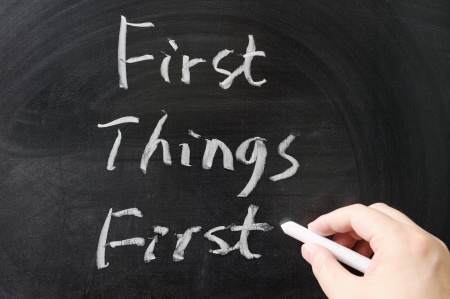Setting Priorities
As an entrepreneur starting or growing a company, you have a million things to do. Every day. How do you decide what to focus on?
There are two things to consider here. First is deciding what’s important; second is understanding what you are good at.
Most of the essential things are pretty obvious: performing a thorough analysis of the market and competition; preparing your product or service to go to market (R&D, testing, product management, etc.); establishing a means of getting it to market (distribution, sales, marketing, beta customer relationships, etc.); recruiting the right team; hiring the right attorneys and accountants; finding capital to make it all happen; developing a sustainable competitive advantage; preparing a business plan; and so forth. These are just a few of the many absolute musts for almost any kind of business.
Many entrepreneurs fall into the trap of obsessing over relatively unimportant things: spending days on end shopping for office furniture (just get something functional for now and trade up once you’ve grown successful), designing an elaborate brochure for a product that doesn’t even exist yet (the product will inevitably change, so why waste money on brochures that will have to be replaced), setting up a heavy-duty file and e-mail server when the company only has three people, etc. These are all premature if you’re an early-stage company; when you’ve started achieving some level of success, you’ll hire expert people to take care of these details for you.
Other things are less obvious and fall in a grey zone, requiring some weighty introspection and analysis: how much time should you spend on things like designing your logo, business cards, and letterhead; figuring out who to recruit to your board of directors; developing an employee benefits program; etc. Depending on your situation, some of these things may be more or less important than you think they are.
So, the first step in setting priorities is to distinguish between “must haves,” “nice to haves,” and “things that suck up time without improving my chances of success.”
The second consideration lies in understanding what you are good at. Why? Because there are too many things that MUST be done for you to be able to do everything yourself. Since you can’t do everything yourself, you need to focus on executing what you’re good at while hiring somebody else (employees, attorneys, accountants, consultants, etc.) to take care of the rest. Anybody can write a bulletproof contract, but why spend dozens or hundreds of hours doing something that a good lawyer could do in a few hours or what AI could do in a few seconds? It’s a poor use of your time unless you have a law degree or a day job that involves reviewing contracts all day.
It all boils down to opportunity costs – the benefit you could achieve if you spent your time working on something that creates more value. For example, suppose you’re an inventor with minimal exposure to accounting and finance. In that case, you will incur a considerable opportunity cost if you try to develop a financial forecast because you can create more value by further refining your product. You’re better off hiring somebody else to do this for you. For most entrepreneurs, the same can be said of the process of developing a business plan – especially if you plan to use it to raise capital. Unless you fully understand the investor’s mindset, you may be better off finding somebody to help with this process (although the process of writing a draft plan is a precious learning experience if you have the time).
Setting priorities can be extremely difficult. If you have a quantitative mind, you can assign dollar values to the benefit of achieving particular tasks and to your time. Assuming that you accurately quantify the benefits (which can be very difficult), you can do a cost-benefit analysis to decide how to set your priorities and decide on which tasks to do yourself and which to assign to others. If you have more of a qualitative mind, you can use a rule of thumb: nine times out of ten, it’s better to hire an expert than to try to do it yourself (care to perform a root canal on yourself?).
To summarize, figure out what’s important, avoid wasting time on low-value activities, focus your time on the things you’re good at, and get help on the other essential tasks.

